Nghiên cứu việc sử dụng tiếng Anh của sinh viên trong các diễn đàn xã hội trên Facebook của trường Đại học Sư phạm – Đại học Thái Nguyên
Trong những năm gần đây, giới trẻ bao gồm cả sinh viên đã phát triển cách dùng ngôn ngữ trên
các mạng xã hội như Facebook theo cách riêng của mình, trong đó, việc sử dụng tiếng Anh trong
các đăng tải trên mạng xã hội đã trở thành một phần giao tiếp của họ và cũng là một thực tế mới
khá thú vị. Tuy nhiên, chưa có nhiều nghiên cứu đề cập đến hiện tượng này. Bài báo này nghiên
cứu việc sử dụng tiếng Anh của sinh viên trong các diễn đàn xã hội trên Facebook của trường Đại
học Sư phạm – Đại học Thái Nguyên; đồng thời tìm hiểu quan điểm của sinh viên về việc tiếng
Anh được sử dụng trên các mạng xã hội. Bên cạnh đó, nghiên cứu này cũng phân tích chất lượng
sử dụng tiếng Anh của sinh viên và đưa ra những thảo luận có thể đem lại những cái nhìn sâu sắc
hơn về hiện tượng này. Bài báo hi vọng sẽ khơi gợi cho những nghiên cứu có hệ thống hơn về việc
sử dụng tiếng Anh trên các diễn đàn xã hội của Việt Nam như một hiện tượng ngôn ngữ và xã hội
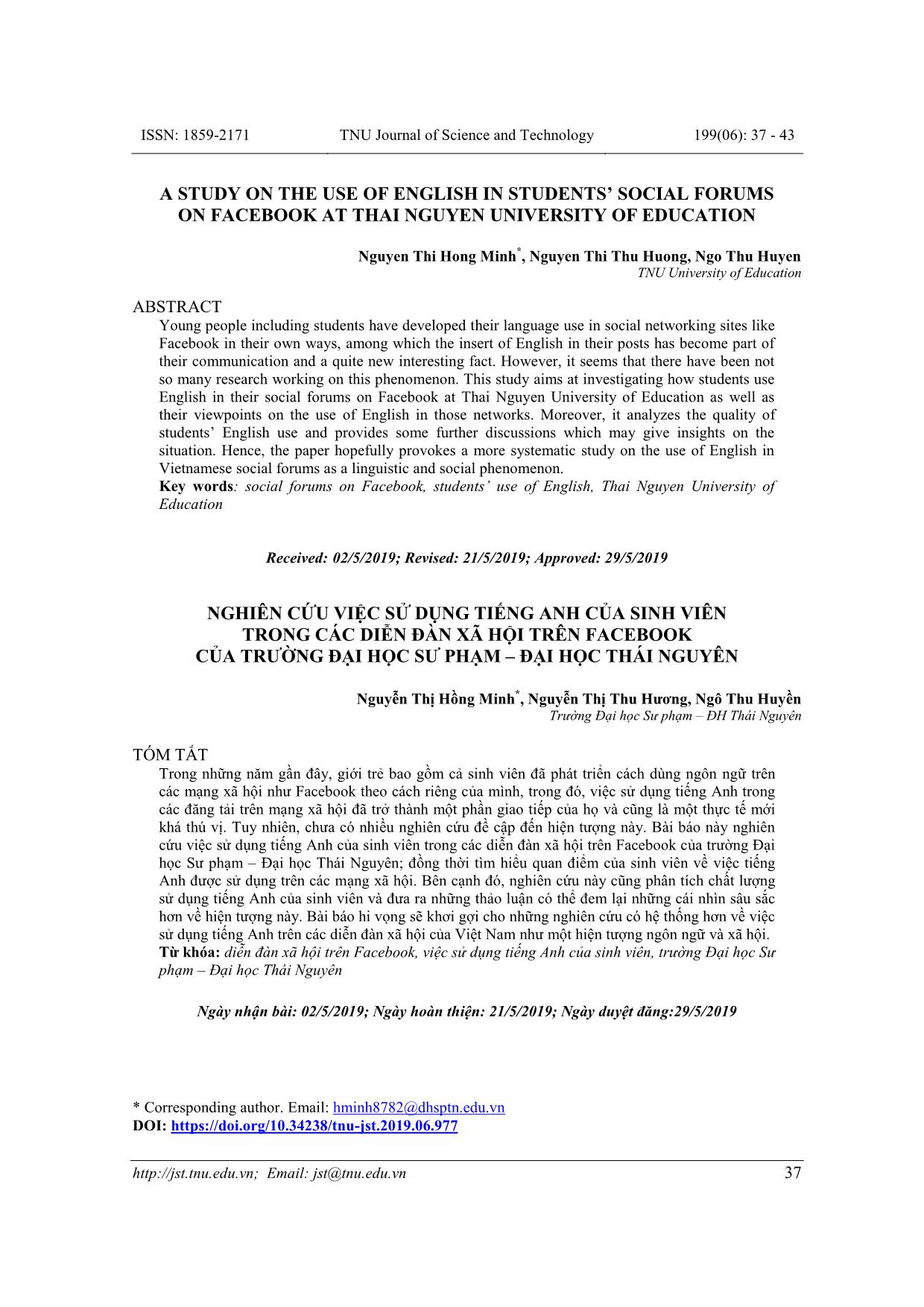
Trang 1
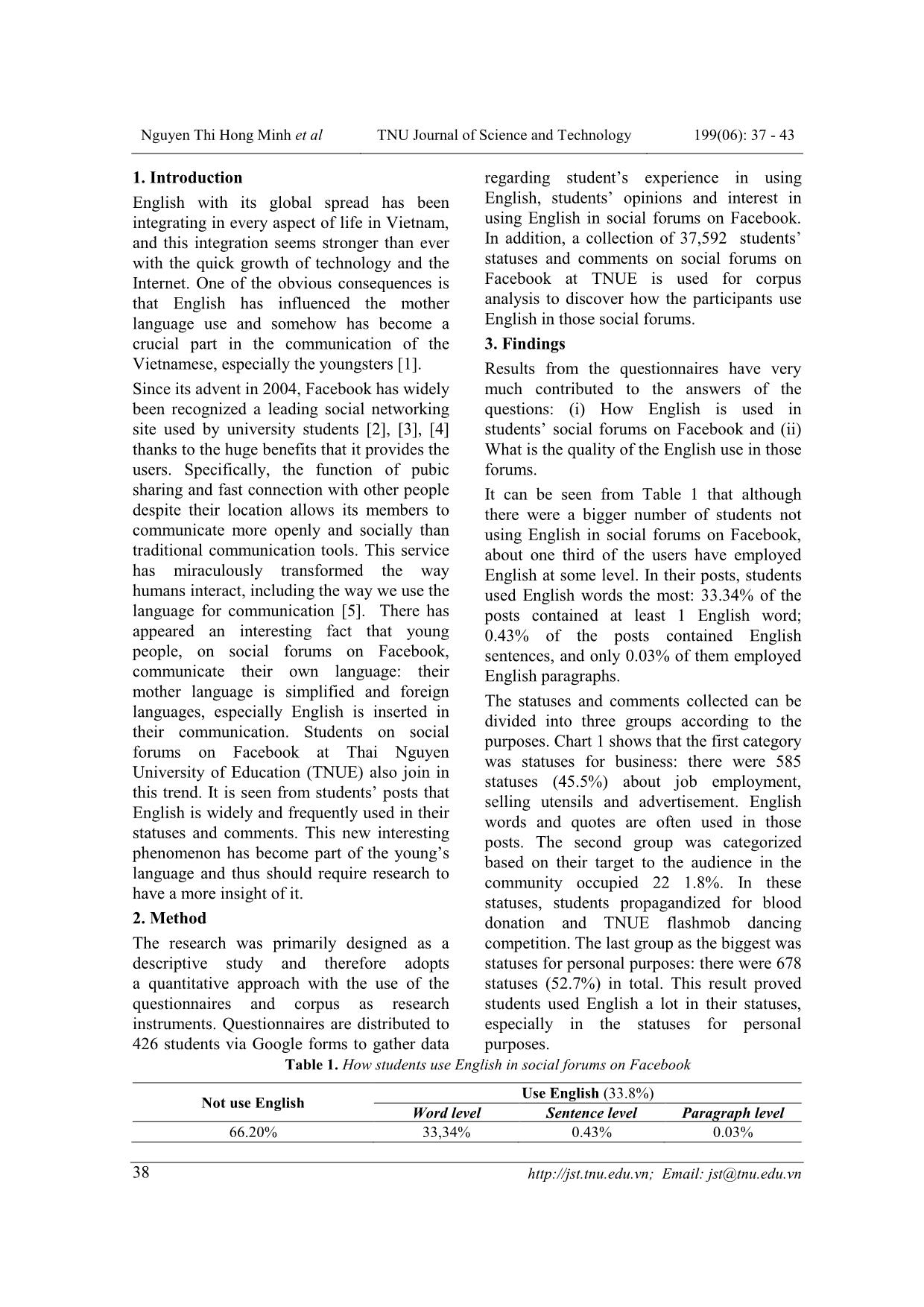
Trang 2
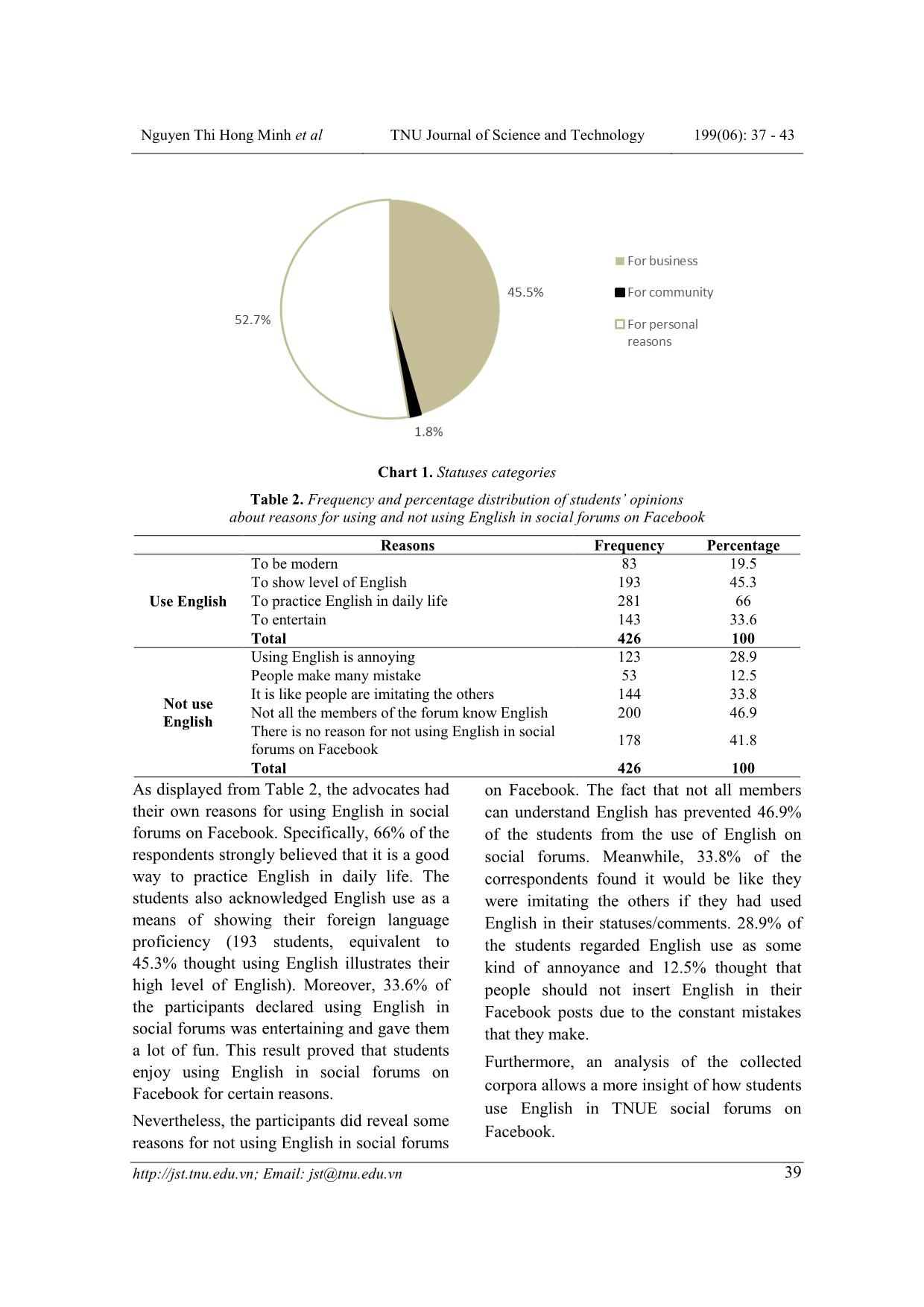
Trang 3
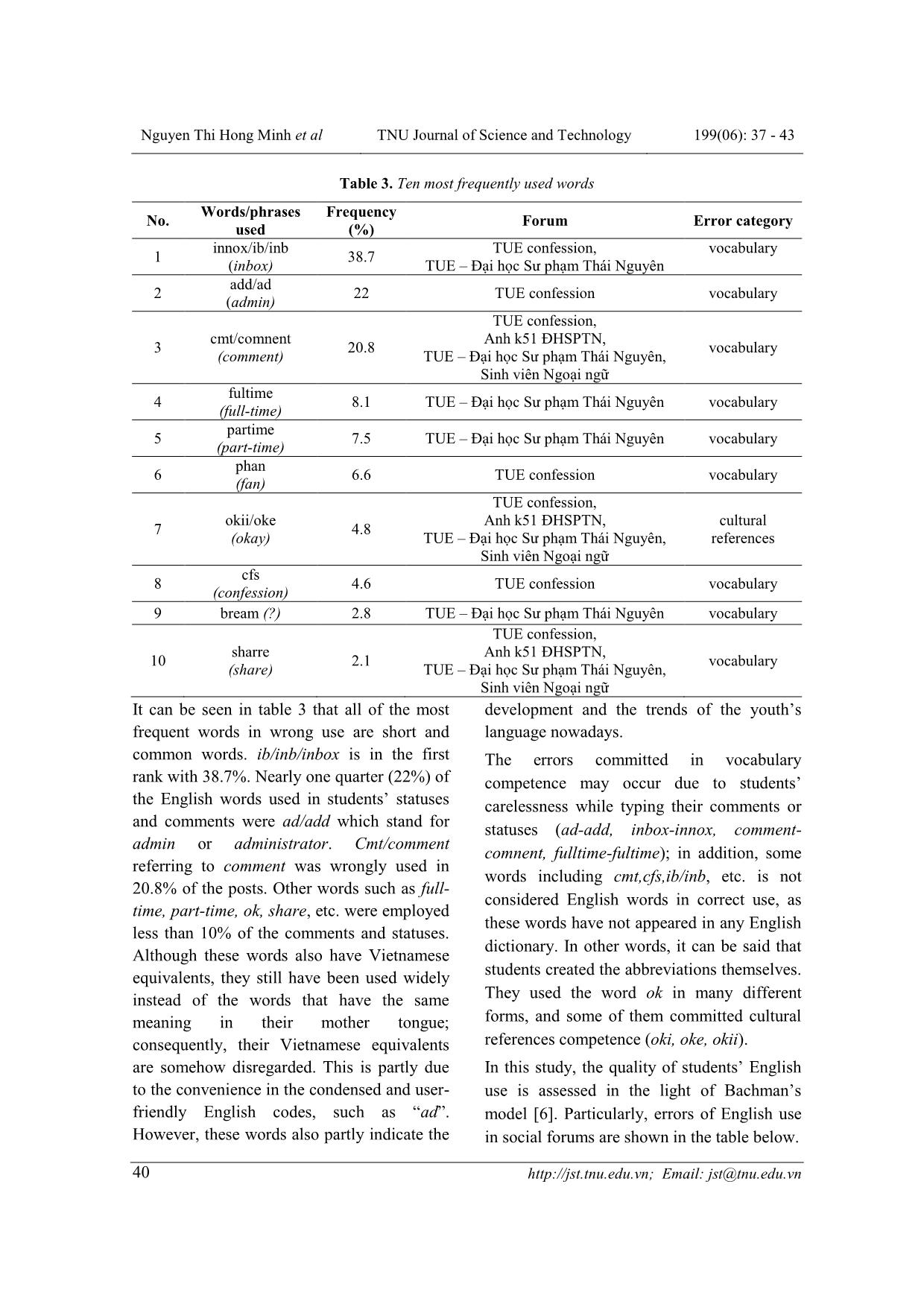
Trang 4
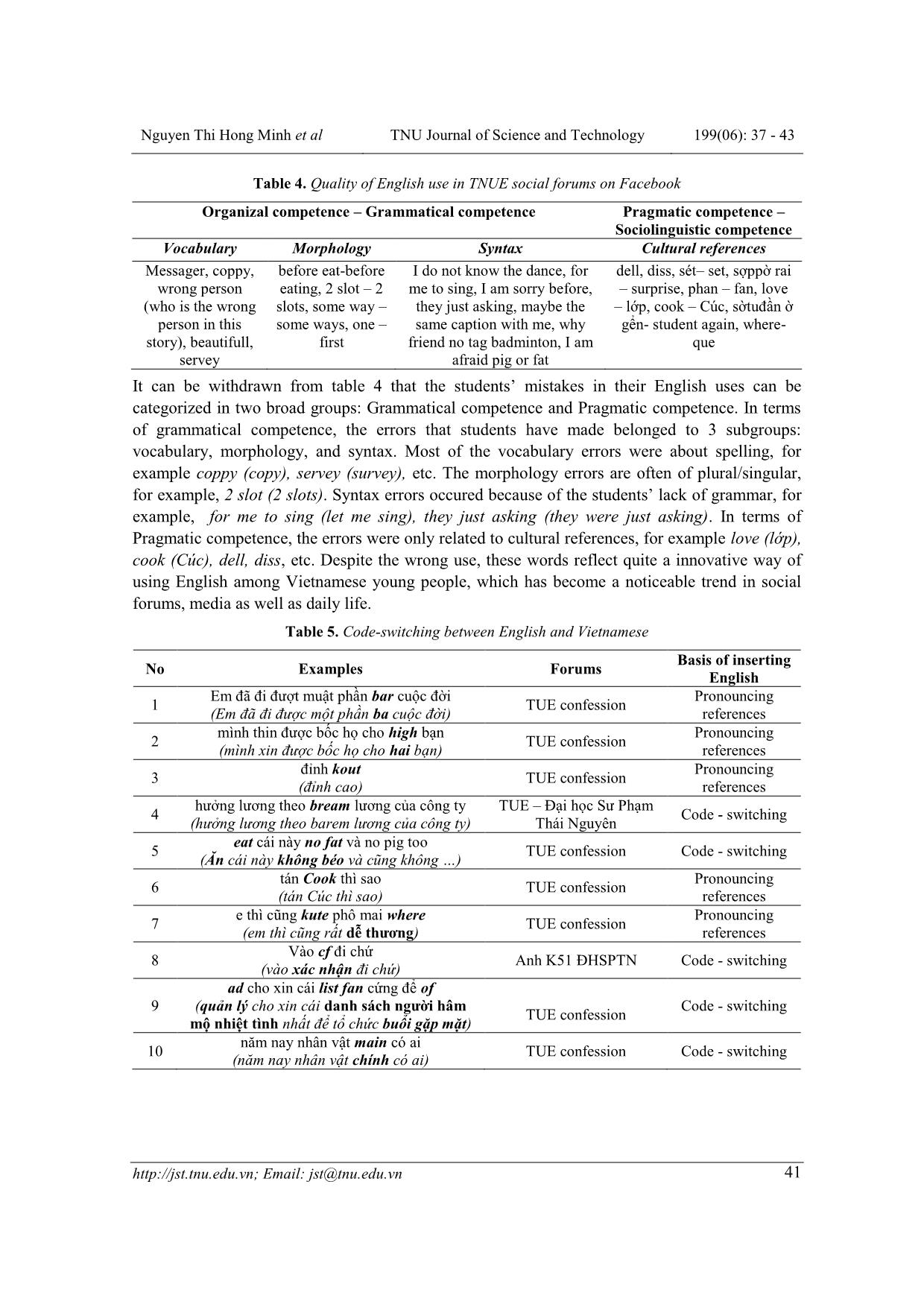
Trang 5
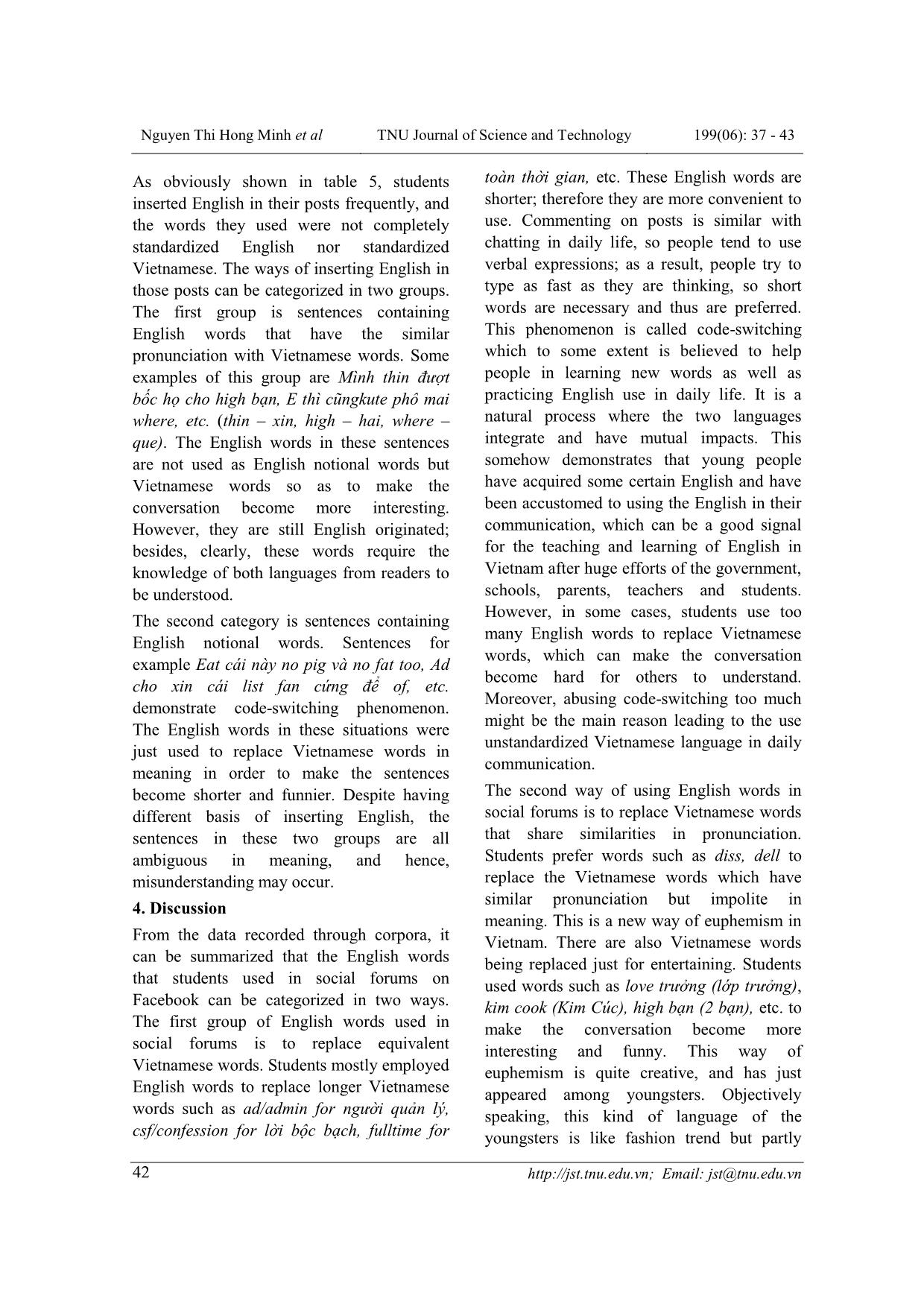
Trang 6
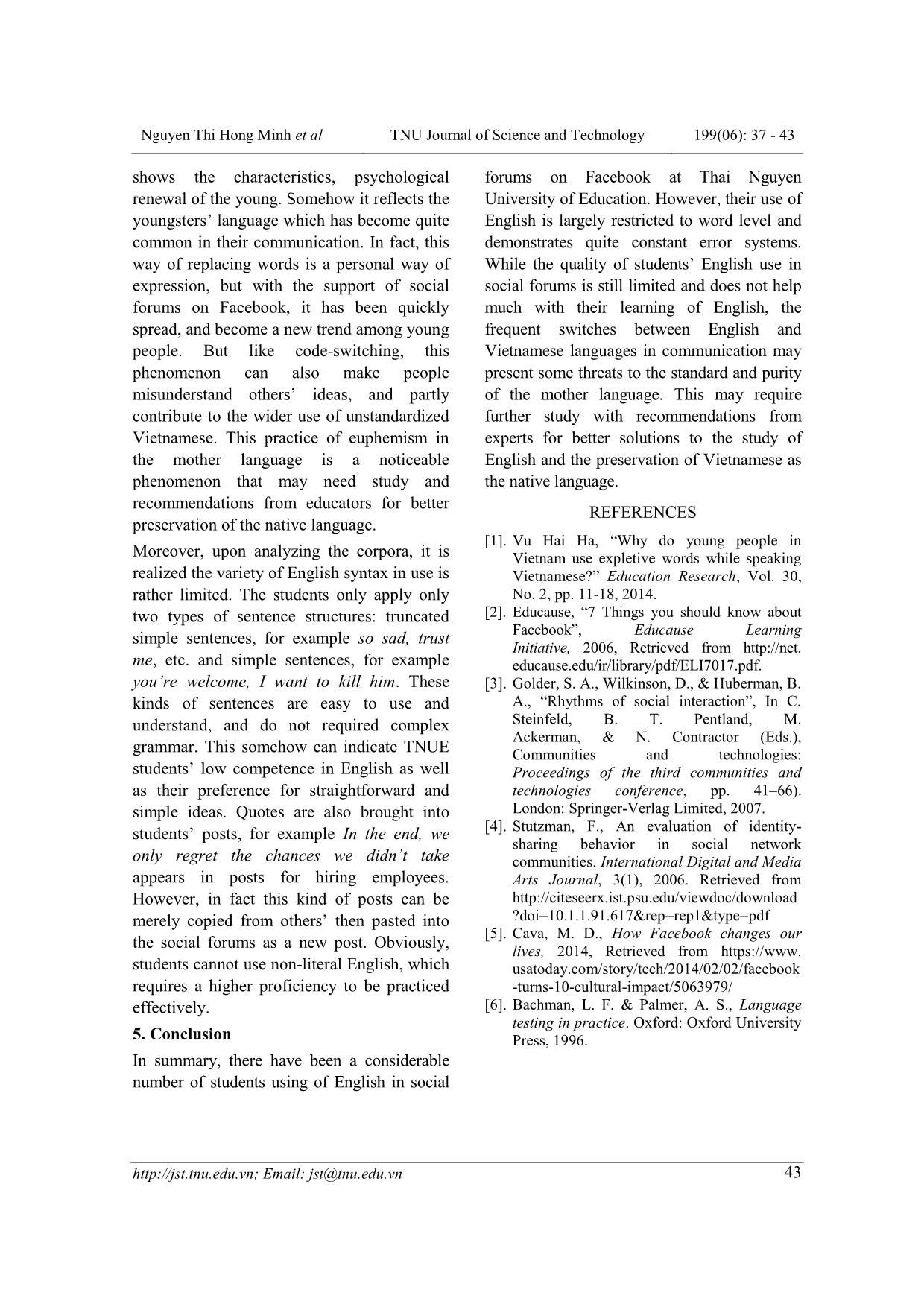
Trang 7
Tóm tắt nội dung tài liệu: Nghiên cứu việc sử dụng tiếng Anh của sinh viên trong các diễn đàn xã hội trên Facebook của trường Đại học Sư phạm – Đại học Thái Nguyên
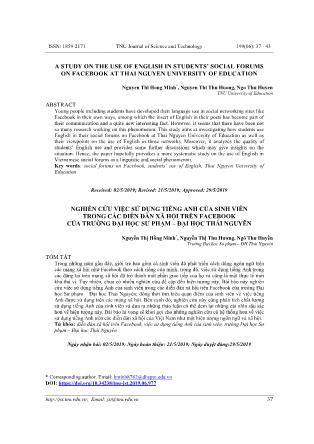
Total 426 100 As displayed from Table 2, the advocates had their own reasons for using English in social forums on Facebook. Specifically, 66% of the respondents strongly believed that it is a good way to practice English in daily life. The students also acknowledged English use as a means of showing their foreign language proficiency (193 students, equivalent to 45.3% thought using English illustrates their high level of English). Moreover, 33.6% of the participants declared using English in social forums was entertaining and gave them a lot of fun. This result proved that students enjoy using English in social forums on Facebook for certain reasons. Nevertheless, the participants did reveal some reasons for not using English in social forums on Facebook. The fact that not all members can understand English has prevented 46.9% of the students from the use of English on social forums. Meanwhile, 33.8% of the correspondents found it would be like they were imitating the others if they had used English in their statuses/comments. 28.9% of the students regarded English use as some kind of annoyance and 12.5% thought that people should not insert English in their Facebook posts due to the constant mistakes that they make. Furthermore, an analysis of the collected corpora allows a more insight of how students use English in TNUE social forums on Facebook. Nguyen Thi Hong Minh et al TNU Journal of Science and Technology 199(06): 37 - 43 Email: jst@tnu.edu.vn 40 Table 3. Ten most frequently used words No. Words/phrases used Frequency (%) Forum Error category 1 innox/ib/inb (inbox) 38.7 TUE confession, TUE – Đại học Sư phạm Thái Nguyên vocabulary 2 add/ad (admin) 22 TUE confession vocabulary 3 cmt/comnent (comment) 20.8 TUE confession, Anh k51 ĐHSPTN, TUE – Đại học Sư phạm Thái Nguyên, Sinh viên Ngoại ngữ vocabulary 4 fultime (full-time) 8.1 TUE – Đại học Sư phạm Thái Nguyên vocabulary 5 partime (part-time) 7.5 TUE – Đại học Sư phạm Thái Nguyên vocabulary 6 phan (fan) 6.6 TUE confession vocabulary 7 okii/oke (okay) 4.8 TUE confession, Anh k51 ĐHSPTN, TUE – Đại học Sư phạm Thái Nguyên, Sinh viên Ngoại ngữ cultural references 8 cfs (confession) 4.6 TUE confession vocabulary 9 bream (?) 2.8 TUE – Đại học Sư phạm Thái Nguyên vocabulary 10 sharre (share) 2.1 TUE confession, Anh k51 ĐHSPTN, TUE – Đại học Sư phạm Thái Nguyên, Sinh viên Ngoại ngữ vocabulary It can be seen in table 3 that all of the most frequent words in wrong use are short and common words. ib/inb/inbox is in the first rank with 38.7%. Nearly one quarter (22%) of the English words used in students’ statuses and comments were ad/add which stand for admin or administrator. Cmt/comment referring to comment was wrongly used in 20.8% of the posts. Other words such as full- time, part-time, ok, share, etc. were employed less than 10% of the comments and statuses. Although these words also have Vietnamese equivalents, they still have been used widely instead of the words that have the same meaning in their mother tongue; consequently, their Vietnamese equivalents are somehow disregarded. This is partly due to the convenience in the condensed and user- friendly English codes, such as “ad”. However, these words also partly indicate the development and the trends of the youth’s language nowadays. The errors committed in vocabulary competence may occur due to students’ carelessness while typing their comments or statuses (ad-add, inbox-innox, comment- comnent, fulltime-fultime); in addition, some words including cmt,cfs,ib/inb, etc. is not considered English words in correct use, as these words have not appeared in any English dictionary. In other words, it can be said that students created the abbreviations themselves. They used the word ok in many different forms, and some of them committed cultural references competence (oki, oke, okii). In this study, the quality of students’ English use is assessed in the light of Bachman’s model [6]. Particularly, errors of English use in social forums are shown in the table below. Nguyen Thi Hong Minh et al TNU Journal of Science and Technology 199(06): 37 - 43 Email: jst@tnu.edu.vn 41 Table 4. Quality of English use in TNUE social forums on Facebook Organizal competence – Grammatical competence Pragmatic competence – Sociolinguistic competence Vocabulary Morphology Syntax Cultural references Messager, coppy, wrong person (who is the wrong person in this story), beautifull, servey before eat-before eating, 2 slot – 2 slots, some way – some ways, one – first I do not know the dance, for me to sing, I am sorry before, they just asking, maybe the same caption with me, why friend no tag badminton, I am afraid pig or fat dell, diss, sét– set, sợppờ rai – surprise, phan – fan, love – lớp, cook – Cúc, sờtuđần ờ gển- student again, where- que It can be withdrawn from table 4 that the students’ mistakes in their English uses can be categorized in two broad groups: Grammatical competence and Pragmatic competence. In terms of grammatical competence, the errors that students have made belonged to 3 subgroups: vocabulary, morphology, and syntax. Most of the vocabulary errors were about spelling, for example coppy (copy), servey (survey), etc. The morphology errors are often of plural/singular, for example, 2 slot (2 slots). Syntax errors occured because of the students’ lack of grammar, for example, for me to sing (let me sing), they just asking (they were just asking). In terms of Pragmatic competence, the errors were only related to cultural references, for example love (lớp), cook (Cúc), dell, diss, etc. Despite the wrong use, these words reflect quite a innovative way of using English among Vietnamese young people, which has become a noticeable trend in social forums, media as well as daily life. Table 5. Code-switching between English and Vietnamese No Examples Forums Basis of inserting English 1 Em đã đi đượt muật phần bar cuộc đời (Em đã đi được một phần ba cuộc đời) TUE confession Pronouncing references 2 mình thin được bốc họ cho high bạn (mình xin được bốc họ cho hai bạn) TUE confession Pronouncing references 3 đỉnh kout (đỉnh cao) TUE confession Pronouncing references 4 hưởng lương theo bream lương của công ty (hưởng lương theo barem lương của công ty) TUE – Đại học Sư Phạm Thái Nguyên Code - switching 5 eat cái này no fat và no pig too (Ăn cái này không béo và cũng không ) TUE confession Code - switching 6 tán Cook thì sao (tán Cúc thì sao) TUE confession Pronouncing references 7 e thì cũng kute phô mai where (em thì cũng rất dễ thương) TUE confession Pronouncing references 8 Vào cf đi chứ (vào xác nhận đi chứ) Anh K51 ĐHSPTN Code - switching 9 ad cho xin cái list fan cứng để of (quản lý cho xin cái danh sách người hâm mộ nhiệt tình nhất để tổ chức buổi gặp mặt) TUE confession Code - switching 10 năm nay nhân vật main có ai (năm nay nhân vật chính có ai) TUE confession Code - switching Nguyen Thi Hong Minh et al TNU Journal of Science and Technology 199(06): 37 - 43 Email: jst@tnu.edu.vn 42 As obviously shown in table 5, students inserted English in their posts frequently, and the words they used were not completely standardized English nor standardized Vietnamese. The ways of inserting English in those posts can be categorized in two groups. The first group is sentences containing English words that have the similar pronunciation with Vietnamese words. Some examples of this group are Mình thin đượt bốc họ cho high bạn, E thì cũngkute phô mai where, etc. (thin – xin, high – hai, where – que). The English words in these sentences are not used as English notional words but Vietnamese words so as to make the conversation become more interesting. However, they are still English originated; besides, clearly, these words require the knowledge of both languages from readers to be understood. The second category is sentences containing English notional words. Sentences for example Eat cái này no pig và no fat too, Ad cho xin cái list fan cứng để of, etc. demonstrate code-switching phenomenon. The English words in these situations were just used to replace Vietnamese words in meaning in order to make the sentences become shorter and funnier. Despite having different basis of inserting English, the sentences in these two groups are all ambiguous in meaning, and hence, misunderstanding may occur. 4. Discussion From the data recorded through corpora, it can be summarized that the English words that students used in social forums on Facebook can be categorized in two ways. The first group of English words used in social forums is to replace equivalent Vietnamese words. Students mostly employed English words to replace longer Vietnamese words such as ad/admin for người quản lý, csf/confession for lời bộc bạch, fulltime for toàn thời gian, etc. These English words are shorter; therefore they are more convenient to use. Commenting on posts is similar with chatting in daily life, so people tend to use verbal expressions; as a result, people try to type as fast as they are thinking, so short words are necessary and thus are preferred. This phenomenon is called code-switching which to some extent is believed to help people in learning new words as well as practicing English use in daily life. It is a natural process where the two languages integrate and have mutual impacts. This somehow demonstrates that young people have acquired some certain English and have been accustomed to using the English in their communication, which can be a good signal for the teaching and learning of English in Vietnam after huge efforts of the government, schools, parents, teachers and students. However, in some cases, students use too many English words to replace Vietnamese words, which can make the conversation become hard for others to understand. Moreover, abusing code-switching too much might be the main reason leading to the use unstandardized Vietnamese language in daily communication. The second way of using English words in social forums is to replace Vietnamese words that share similarities in pronunciation. Students prefer words such as diss, dell to replace the Vietnamese words which have similar pronunciation but impolite in meaning. This is a new way of euphemism in Vietnam. There are also Vietnamese words being replaced just for entertaining. Students used words such as love trưởng (lớp trưởng), kim cook (Kim Cúc), high bạn (2 bạn), etc. to make the conversation become more interesting and funny. This way of euphemism is quite creative, and has just appeared among youngsters. Objectively speaking, this kind of language of the youngsters is like fashion trend but partly Nguyen Thi Hong Minh et al TNU Journal of Science and Technology 199(06): 37 - 43 Email: jst@tnu.edu.vn 43 shows the characteristics, psychological renewal of the young. Somehow it reflects the youngsters’ language which has become quite common in their communication. In fact, this way of replacing words is a personal way of expression, but with the support of social forums on Facebook, it has been quickly spread, and become a new trend among young people. But like code-switching, this phenomenon can also make people misunderstand others’ ideas, and partly contribute to the wider use of unstandardized Vietnamese. This practice of euphemism in the mother language is a noticeable phenomenon that may need study and recommendations from educators for better preservation of the native language. Moreover, upon analyzing the corpora, it is realized the variety of English syntax in use is rather limited. The students only apply only two types of sentence structures: truncated simple sentences, for example so sad, trust me, etc. and simple sentences, for example you’re welcome, I want to kill him. These kinds of sentences are easy to use and understand, and do not required complex grammar. This somehow can indicate TNUE students’ low competence in English as well as their preference for straightforward and simple ideas. Quotes are also brought into students’ posts, for example In the end, we only regret the chances we didn’t take appears in posts for hiring employees. However, in fact this kind of posts can be merely copied from others’ then pasted into the social forums as a new post. Obviously, students cannot use non-literal English, which requires a higher proficiency to be practiced effectively. 5. Conclusion In summary, there have been a considerable number of students using of English in social forums on Facebook at Thai Nguyen University of Education. However, their use of English is largely restricted to word level and demonstrates quite constant error systems. While the quality of students’ English use in social forums is still limited and does not help much with their learning of English, the frequent switches between English and Vietnamese languages in communication may present some threats to the standard and purity of the mother language. This may require further study with recommendations from experts for better solutions to the study of English and the preservation of Vietnamese as the native language. REFERENCES [1]. Vu Hai Ha, “Why do young people in Vietnam use expletive words while speaking Vietnamese?” Education Research, Vol. 30, No. 2, pp. 11-18, 2014. [2]. Educause, “7 Things you should know about Facebook”, Educause Learning Initiative, 2006, Retrieved from educause.edu/ir/library/pdf/ELI7017.pdf. [3]. Golder, S. A., Wilkinson, D., & Huberman, B. A., “Rhythms of social interaction”, In C. Steinfeld, B. T. Pentland, M. Ackerman, & N. Contractor (Eds.), Communities and technologies: Proceedings of the third communities and technologies conference, pp. 41–66). London: Springer-Verlag Limited, 2007. [4]. Stutzman, F., An evaluation of identity- sharing behavior in social network communities. International Digital and Media Arts Journal, 3(1), 2006. Retrieved from ?doi=10.1.1.91.617&rep=rep1&type=pdf [5]. Cava, M. D., How Facebook changes our lives, 2014, Retrieved from https://www. usatoday.com/story/tech/2014/02/02/facebook -turns-10-cultural-impact/5063979/ [6]. Bachman, L. F. & Palmer, A. S., Language testing in practice. Oxford: Oxford University Press, 1996.
File đính kèm:
 nghien_cuu_viec_su_dung_tieng_anh_cua_sinh_vien_trong_cac_di.pdf
nghien_cuu_viec_su_dung_tieng_anh_cua_sinh_vien_trong_cac_di.pdf

